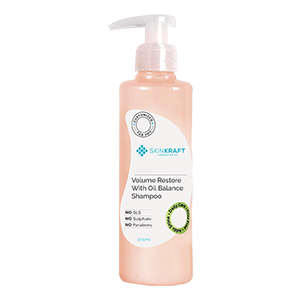Coarse hair can be a little hard to manage. It typically feels rough in texture and means having thicker hair strands. The concerns with this type of hair are usually associated with frizz, dryness, and stubbornness, making it challenging to control.
If you want to look after your coarse hair, it's vital to familiarize yourself with the best ways to take care of coarse hair. Read on to learn more.
Highlights:
What Is Coarse Hair?
Coarse hair has strands that are thicker and wider in circumference than other hair types. Unlike thin or medium hair, coarse hair contains all three layers of the hair shaft - cortex, cuticle, and medulla.
Causes Of Coarse Hair
- Genetics
- Hormonal imbalance
- Iron deficiency
- Calcium deficiency
- Excessive use of heat styling tools
- Overexposure to harsh chemicals
- Certain medical conditions
- Sometimes few prescription drugs can cause hair to become coarse, such as steroids and Minoxidil [1] – a hair growth medication
How To Determine If You Have Coarse Hair?
To check if you have coarse hair, take a strand of your hair and roll it between your fingers. You would be able to feel the thickness and determine your hair type. Coarse hair strands typically look and feel wider than a piece of sewing thread. If your hair strand feels thinner than the sewing thread, you have fine hair.
How To Take Care Of Your Coarse Hair?
1. Condition Your Hair
Conditioning coarse hair can solve a lot of problems associated with it. Using nourishing conditioners and serums allows your hair shaft to lay flat and restore its natural shape.
Unruly coarse hair also responds well to both frizz-taming conditioning creams and smoothening serums. Look for hair care products that combat the concerns of coarse hair.
SkinKraft offers a customized hair care regimen based on your hair's unique type and needs.
2. Shun Alcohol-Based Products
Alcohol is a core ingredient in many hair care products, especially hair sprays and hair gels. While these products can give you temporary results to tame your hair, they may significantly evaporate your hair's moisture.
Since coarse hair is more prone to damage due to dryness, using products that contain alcohol will likely make your hair drier. Try to invest in alcohol-free, gentle formulas for your hair care, and styling products.
3. Limit Heat Styling
The excessive use of heat styling tools to curl and straighten your hair will rob it of its moisture. When used regularly, heat can significantly damage the hair, making it dry, frizzy, and difficult to manage.
Keep your heat styling routine within a limit to protect your coarse hair. To minimize damage, use a heat protectant spray and keep the blow dryer about six inches away from your hair.
4. Deep Conditioning Masks
Deep conditioning is probably the best way to keep coarse hair healthy. You can opt for a hair mask that nourishes, moisturizes, and softens the hair.
You can also make a homemade deep conditioning hair mask [2] with natural ingredients like coconut oil, olive oil, honey, aloe vera, and avocado.
For added nourishment, you can also try a hot oil massage on your head once a week. Avocado oil, jojoba oil, and coconut oil effectively moisturize and protect your hair while also reducing frizz and dryness. [3]
5. Boost Your Vitamin Intake
Using hair care products may protect your hair from the outside, but you have to think about what goes inside too. What you eat or drink can affect the well-being of your hair from within. [4] Vitamins A, C, D, E, biotin, niacin, iron are especially important for healthy hair.
In case you find it difficult to get these nutrients from your meals, consider taking them as supplements. It will help you fulfill the deficiencies in your diet. We recommend talking to your doctor before taking any supplements.
6. Trim Your Hair
Irrespective of your hair type, trimming your hair every 8 to 10 weeks is highly advisable. Regular trims can help reduce split ends and improve the look and feel of your hair. Also, by trimming unhealthy split ends, your hair will have less flyaways and breakage, making it look thicker and even shinier.
7. Choose The Right Brush
A round or flat brush with ample space between the bristles is an ideal choice for coarse hair. Brush your coarse hair when it is slightly damp to minimize frizz and tangles. Try to avoid over-brushing it.
8. Use A Silk Pillowcase
Using a silk pillowcase can offer extraordinary benefits for coarse hair. Silk pillowcases have a smooth surface that prevents friction in your hair that arises from tossing and turning while sleeping, thus preventing damage. They also absorb less moisture, giving your hair a chance to retain its natural oil.

Does Hair Get More Coarse As You Age?
Like your skin, your hair is just as susceptible to the consequences of time. As you age, your hair generally gets drier, and the individual strands get more coarse.
The Difference Between Coarse Vs Curly Hair Vs Fine Hair Vs Thick Hair
|
Coarse Hair |
Curly Hair |
Fine Hair |
Thick Hair |
|
1. Coarse hair simply means thicker hair strands than any other hair texture such as fine and medium. |
1. Curly hair doesn’t have to be coarse in texture. |
1. Fine hair is hair texture with a small diameter. |
1. Thick hair refers to the density of your hair or the number of follicles on your head. |
|
2. Coarse hair is really wide in diameter. It has a typical diameter of about 120 microns. |
2. Irrespective of the texture, fine, medium, or coarse, curly hair is more prone to breakage than other hair types. |
2. It has a typical diameter of about 50 microns. |
2. Thick hair is mostly mistaken as coarse hair but coarse hair is determined by the diameter, not the density. |
|
3. Because of the wide texture, it may face dryness and other damages. |
3. In most cases, curly hair has a dry and frizzy nature and is prone to tangles. |
3. If you have fine hair, it may feel light, because it lacks natural bounce. |
3. Thick hair takes a lot of time to dry and damp locks cause a lot of issues in your scalp. |
|
4. Thin, curly, wavy, whichever hair type you have, it can be coarse in texture. |
4. A favourable balance of moisture and protein is required for healthy curls. |
4. Fine hair can either be straight or wavy as in any caucasian hair types. |
4. Thick hair has a tendency to get frizzy and prone to breakage. |
Wrapping Up
In naturally coarse hair, the hair shafts are thicker and wider in circumference than other hair types. If you treat your coarse hair properly and manage it with the right care, it will look fuller with more volume and body while holding any hairstyle with ease.
Like other hair types, if your hair is exposed to too much heat and styling, it can become dry, brittle, and frizzy.
It is essential to use the right products and ingredients that are well-suited to coarse hair. At SkinKraft, we customize a hair care regimen that suits your unique hair type and characteristics.
Recommended Products
Was this Article helpful?
- Least helpful
- Most helpful











